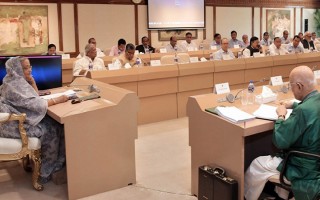Cabinet nods allowing India to use Ctg, Mongla ports
The cabinet on Monday approved the draft of an agreement allowing India to use Chattogram and Mongla ports for movement of goods from one place to another in India through Bangladesh territory at risk of congestion at the country’s premier seaport in Chattogram.
Cabinet secretary Mohammad Shafiul Alam disclosed the approval at a briefing at the secretariat after the cabinet meeting at the Prime Minister’s Office.
The shipping ministry placed the draft of the Agreement on the use of Chattogram and Mongla ports for the movement of goods to and from India to be signed by the governments of Bangladesh and India.
Under the agreement, India would be allowed to use Chattogram and Mongla seaports to transport its goods to North Eastern states through Bangladesh in a short time and for the services they would pay charges in keeping with principles of the General Agreement on Tariff and Trade as followed elsewhere in the world, the cabinet secretary said.
The agreement would remain effective for five years with a provision of auto renewal for another five years and either of the country could cancel it by a notice of five months, he added.
Four routes mentioned for the transhipment of goods are Chittagong Port/ Mongla Port to Agartala via Akhaura, Chattogram/ Mongla to Daouki via Tamabil, Chattogram/ Mongla to Sutarkandi via Sheola and Chattogram/ Mongla to Bibekbazar via Simantapur, Shafiul said.
He said that only Bangladeshi vehicles and vessels would be used to carry the goods inside Bangladesh under the agreement.
Primarily the agreement would be signed between Bangladesh and India and Nepal and Bhutan could also join the pact as such provision was included, he said.
Shafiul said that the standard operating procedures would have the details as to how the agreement would be executed.
Officials said that both the Chittagong and Mongla port authorities earlier raised objection to the demand by India for ‘priority’ space at both the ports for the Indian goods under the proposed deal.
Centre for Policy Dialogue distinguished fellow Mustafizur Rahman earlier said that the government should be careful to provide India to use the ports considering congestion.
The ports already struggle to handle containers of the country’s exports and imports due to lack of infrastructure and logistics, he said.
Without improving infrastructure and logistics the proposed use of the port by India would bring no benefit to Bangladesh, he noted.
Chittagong port which accounts for 80 per cent of the country’s seaborne traffic worth about $60 billion a year would not get additional fees for allowing transit to India, the officials said.
India proposed that Bangladesh should not impose ‘duties’ or ‘other taxes’ excepting administrative fees on transit through Chittagong and Mongla ports.
Earlier, Dhaka allowed the transit of Indian goods to its northern states through river ports including Ashuganj paying Tk 192 for per tonne goods.
Out of Tk 192, the revenue board would get Tk 130 as customs duty while the roads and highway department would get Tk 52 and the Bangladesh Inland Water Transport Authority would receive Tk 10.
The transit fee was much lower compared to Tk 1,058 recommended by a core committee of the Bangladesh Tariff Commission in 2011.
The cabinet secretary said that the neighbouring country, however, would need to follow the international rules and General Agreement on Tariff and Trade as well as Bangladeshi laws and rules.
The proposed agreement said that Indian companies would pay charges, fees and carrying costs in accordance with the General Agreement on Tariff and Trade for using roads and port facilities, he replied to a question.
The cabinet also approved another draft of an agreement to be signed by state owned West Zone Power Distribution Company with Chinese power company Hexing Electrical Co Ltd to establish a joint venture company.
The joint venture would be called Bangladesh Smart Electrical Company Ltd to produce smart meter and other electrical goods with authorised and paid up capitals worth Tk 50 crore and Tk 28.60 crore respectively.
The cabinet secretary said that Bangladesh would have 51 per cent share while the Chinese company would own the rest 49 per cent.
The cabinet also approved the drafts of Bangladesh Public Administration Training Centre Bill and National Curriculum and Textbook Board Bill to replace two related ordinances promulgated in 1984 and 1983 respectively by military regime.
Shafiul said Bangladesh Public Administration Training Centre Bill was formulated without major changes.
The National Curriculum and Textbook Board Bill, however, proposed some changes in the previous ordinance, recognising the board as a statutory body under the Secondary and Higher Education Division. ‘During its functioning, the board will, however, follow the directives and instructions to be issued by the government from time to time,’ the cabinet secretary said.
The draft suggested that the board would comprise nine members instead of existing five, including its chairman with specific responsibilities over textbook printing and publication, primary education, secondary and higher secondary education, madrassah education, vocational education, curriculum training, curriculum research and evaluation and finance.
It proposed incorporation of a new provision making it obligatory for the board to submit its annual report to the government by March 31 every year.
The cabinet also adopted an obituary reference expressing shock at the death of ABM Abdus Samad, a valiant freedom fighter and an accused of Agartala Conspiracy Case.
News Courtesy: www.newagebd.net











